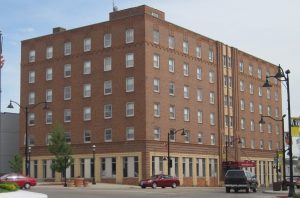Metro East Area News Briefs
Chronicle Media — June 13, 2018
Kim Jones, of the United States Department of Labor, ETA-Office of Apprenticeship, and St. Clair County Board Chairman Mark Kern, both seated, sign the county’s National Apprenticeship Program agreement. (Photo courtesy of St. Clair County)
State’s first National Apprenticeship Program set for St. Clair
Long plagued by high unemployment rates — and growing employer concerns over a dwindling pool of qualified job candidates — the St. Clair County area is about to become home to Illinois’ first National Apprenticeship Program (NAP).
Established under the federal Workforce Innovation and Opportunity Act (WIOA) of 2014, the U.S. Department of Labor’s (USDOL) NAP initiative offers a new breed of performance-based — rather than time-limited — on-the-job training opportunities; designed to provide for long-term careers with competitive salaries and other benefits.
The program offers job-seekers a chance to immediately earn above-average wages — starting at up to $15 per hour — while learning a skill or trade, achieving new USDOL national occupational credentialing, and, potentially, earning college credits.
For participating businesses, the program’s government-registered apprenticeships can offer “a pipeline” of highly skilled workers —custom-trained to flexible standards based on local or national industry requirements, according to the USDOL. Businesses will also benefit from greater productivity and lower turnover, the agency adds.
In addition to on-the-job-training (OJT), the apprenticeship program requires classroom instruction, and work mentorship. Wages increase with skill level increases.
Apprenticeship programs can range in length from one to six years, depending on the complexity of the occupation and the type of training program used.
For example, apprenticeships for home health aide, medical biller-coders, and emergency medical technicians typically last one or two years.
NAP apprenticeships are administered through state-designated Local Workforce Development Areas, established to implement WIOA services based on geographic location, population, and commonality of labor markets.
The new Metro East registered apprenticeship program will be offered in a WIOA encompassing Clinton, Monroe, Randolph, St. Clair, and Washington counties; administered by the St. Clair County Intergovernmental Grants Department.
For additional information see the department’s website at https://tinyurl.com/SCCIGG or call the department at 314– 825-3259.
Granite City Steel furnaces to be fully operational in October
Citing anticipated increases in demand for steel products, U.S. Steel now plans to have both blast furnaces at its Granite City Works operational by about Oct. 1.
The restarting of the facility’s Blast Furnace A, announced June 5, will created 300 new jobs, according to U.S. Steel spokespersons.
The company in March announced plans to re-fire Blast Furnace B, along with the recall of 500 laid-off workers to the plant. The restart of Blast Furnace B is currently in progress, the company reports.
United Steelworkers 1899 and other union locals representing plant workers held a street party June 1 to celebrate the re-firing of that furnace.
U.S. Steel announced the temporary shutdown of most operations at the Granite City Works and the layoff of 2,080 employees in March 2015 citing decreased demand for steel products by the petroleum industry and competition from imported steel. Most operations at the plant had ceased by December of that year.
Announcing plans to resume full capacity production at the plant last week, U.S. Steel credited import tariff imposed by the Trump administration earlier this year.
St. Clair sees 21.2 percent spike in home sales
Sales of residential real estate in Metro East increased 4.3 percent year-over-year during April —the traditional start of the spring homebuying season, according to Illinois Realtors.
In all, some 794 units were sold in Bond, Calhoun, Clinton, Jersey, Macoupin, Madison, Monroe and St. Clair counties.
St. Clair County led all counties statewide with a 21.2 percent increase. Some 320 units were sold in the county during the reporting period.
The median price for a home in Metro East is up 6.5 percent so far this year to $133,075.
Statewide home sales (including single-family homes and condominiums) in April 2018 totaled 14,478 homes sold, up 1.9 percent from 14,202 in April 2017.
The statewide median price in April was $210,000, up 5 percent from April 2017, when the median price was $200,000. The median is a typical market price where half the homes sold for more and half sold for less.
“April traditionally marks the beginning of the spring selling season, and this year we saw sellers reap the benefit of tight housing inventories in many areas of the state,” said Illinois Realtors President Matt Difanis. “Although we saw many more properties on the market in April, the surge is nowhere close to meeting consumer demand.”
It took an average of 54 days to sell an Illinois home during the start of the homebuying season; down from 61 days a year ago. Statewide, available housing inventory totaled 51,527 homes for sale, a 10.4 percent decline from April 2017 when there were 57,537 homes on the market.

A renovation of the historic Hotel Belleville/Meredith Home calls for 47 affordable senior apartments and retail space on the Public Square in downtown Belleville. (Photo courtesy of the Belleville Historical Society)
Six affordable housing developments receive tax credits
The Illinois Housing Development Authority (IHDA) Board of Directors has awarded more than $26.4 million in federal Low-Income Housing Tax Credits (LIHTC) to fund 26 affordable housing developments across the state — including six in Metro East.
The tax credits are sold to investors to generate private capital for the creation or preservation of affordable apartments for low- to moderate-income families, seniors, veterans, and persons with special needs.
The Internal Revenue Service allocates a certain number of tax credits annually to each state based on population. In Illinois, the IHDA then awards the credits to developers through a competitive application process.
Developers can then sell the credits to investors and use the equity generated to reduce construction and operating costs. The savings in underwriting are passed on to the renter in the form of below-market rents, which must remain affordable for a minimum of 30 years.
Metro East projects selected for low-income tax credits this year are:
— Lofts on the Square (Belleville): Renovation of the historic Hotel Belleville/Meredith Home into 47 affordable senior apartments and retail space on the Public Square in downtown Belleville. The Southwestern Illinois Development Authority will oversee the adaptive reuse of the building, which will convert the second through sixth floors into apartments for residents over 55 who earn less than 60 percent of the area median income.
— Edison Avenue Lofts (Granite City): A historic rehabilitation of the former YMCA in downtown Granite City into a mixed-income, mixed-use apartment building offering 37 affordable units. Developed by Rise Community Development, the building is in a highly walkable section of downtown adjacent to a park, a new community theater, and a historic library.
— The Community of Sunnybrook (Alton): A new development offering 38 affordable apartments and two market-rate units for families just east of downtown Alton. Currently a vacant field, the property will soon feature 20 duplex buildings containing a mix of one-, two- and three-bedroom units. After 15 years, the developers will make the units available as opportunities for affordable homeownership.
— Diamond Senior Apartments of Breese (Breese): New construction of seven single-story townhouse buildings containing 40 affordable apartments for seniors by 3Diamond Development. Construction will also include new roads, walking paths, and parking. All 40 units will be affordable to residents earning no more than 60 percent of the area median income.
— Flax Meadow Townhomes (Highland): A new construction development of eight one- and two-story townhomes. When complete, Flax Meadow will offer 32 affordable units of family housing with on-site management offices, as well as a playground and open green space.
— Highland Villas (Highland): The Southwestern Illinois Development Authority will build 48 affordable villa-style units for income eligible seniors. Each unit will be designed to incorporate the highest level of accessibility and a variety of in-unit amenities. The development will also include the construction of a community building.
–Metro East Area News Briefs–



